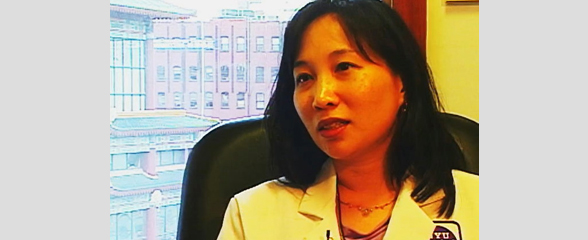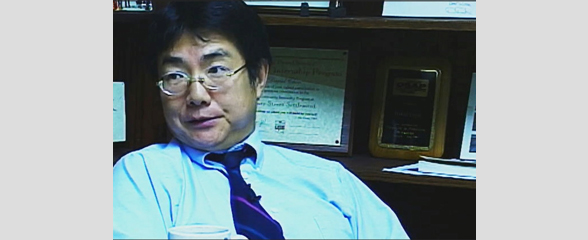Cantonese dialects

2014.036.001 Oral History Interview with Blanche Leung June 16, 2004
Blanche Leung, M.D., was born on April 16, 1970 in Queens, New York to immigrant parents from Hong Kong and Canton, China. She sits down to recount the immigration story of her parents, from when they left China as young children following the Communist changeover to their time in Hong Kong, Taiwan, Canada and the United States, where they ultimately settled in 1969. Her father was a pharmacist and her mother was a hematology lab manager. She talks extensively about the family pharmacy located on Lafayette and Walker Streets, which served as a focal point for the family. Blanche and her mother frequently went to assist at the pharmacy in addition to spending time in the Chinatown area for errands and extracurricular activities such as ping pong and Chinese School even though they lived in Elmhurst, Queens.
Her childhood relationship with the Chinatown community and the New York Chinese community evolved when she became a medical professional and served as a liaison between Chinese patients and other hospital staff to improve the quality of care. She would later open a practice in Chinatown and describes the interactions she has with her Chinese patients. The interview conversation transitions from talking about Chinese-speaking patients and Chinese language medical resources to her experiences during and after the 9/11 attack. Blanche describes the emotional and physical impact on Chinatown following the terrorist attack in the context of her patient care, diagnosis, and medical requests in addition to the change in the street scene in the aftermath. She concludes the interview with answers to questions regarding Chinatown rebounding from 9/11 and her intentions to continue her medical practice in Chinatown amidst the ever-changing demographics and geography of Chinatown.

2014.036.015 Oral History Interview with David Chen July 13, 2004
In this interview, David Chen discusses his work at Chinese-American Planning Council (CPC) as an activist in New York City Chinatown. Chen is the director of CPC, a private organization started in 1965 serving the public and focusing on low-income immigrant families, mostly Chinese. Services offered include language classes, translations, daycare centers, job training for adults, senior citizen care, childcare, and Meals on Wheels. Prior to his work at CPC, Chen worked for the mayor in Chicago. While there, he constantly questioned why there was no Chinese funding. While in college, Chen studied to be a social worker and community organizer. He explains that he was not good at chemistry and did not want to pursue medicine or law like his parents expected him to. During college, he and his friends volunteered in Chicago Chinatown, which is much smaller than New York City. In Chicago Chinatown, Chen and his friends taught English classes but there were not many job opportunities in the community, so he decided to work for the government. On a visit to New York City, Chen fell in love with how densely populated and large Chinatown was and was told that there were many job opportunities available. He applied for a position at CPC as a youth director twenty-three years ago, accepted the role, and moved to New York City. Chen was part of "Project Reach", which was an at-risk prevention program for troubled kids. He describes Chinatown as a transient neighborhood in that there is constantly an influx of Chinese immigrants every few years. CPC serves those immigrants by helping them get entry-level jobs and helping them get their foot in the door. By doing so, he hopes that secure immigrants who have gotten aid from CPC would be able to help the next wave. Asked about his upbringing, Chen shares that he is from an upper-middle class family and that his father was an engineer. He was originally born in Shanghai but his family moved to Hong Kong while he was a baby. He came alone to the United States during his final year of high school and focused on school in order to avoid being drafted into the Vietnam War. The last part of the interview briefly covers 9/11. Chen notes that in the recovery and aftermath, Chinatown was largely ignored although it was an adjacent neighborhood to the World Trade Center. Chen also describes how important Chinatown is to tourism because of its restaurants and shopping venues.

2014.036.015 Oral History Interview with David Chen July 13, 2004
In this interview, David Chen discusses his work at Chinese-American Planning Council (CPC) as an activist in New York City Chinatown. Chen is the director of CPC, a private organization started in 1965 serving the public and focusing on low-income immigrant families, mostly Chinese. Services offered include language classes, translations, daycare centers, job training for adults, senior citizen care, childcare, and Meals on Wheels. Prior to his work at CPC, Chen worked for the mayor in Chicago. While there, he constantly questioned why there was no Chinese funding. While in college, Chen studied to be a social worker and community organizer. He explains that he was not good at chemistry and did not want to pursue medicine or law like his parents expected him to. During college, he and his friends volunteered in Chicago Chinatown, which is much smaller than New York City. In Chicago Chinatown, Chen and his friends taught English classes but there were not many job opportunities in the community, so he decided to work for the government. On a visit to New York City, Chen fell in love with how densely populated and large Chinatown was and was told that there were many job opportunities available. He applied for a position at CPC as a youth director twenty-three years ago, accepted the role, and moved to New York City. Chen was part of "Project Reach", which was an at-risk prevention program for troubled kids. He describes Chinatown as a transient neighborhood in that there is constantly an influx of Chinese immigrants every few years. CPC serves those immigrants by helping them get entry-level jobs and helping them get their foot in the door. By doing so, he hopes that secure immigrants who have gotten aid from CPC would be able to help the next wave. Asked about his upbringing, Chen shares that he is from an upper-middle class family and that his father was an engineer. He was originally born in Shanghai but his family moved to Hong Kong while he was a baby. He came alone to the United States during his final year of high school and focused on school in order to avoid being drafted into the Vietnam War. The last part of the interview briefly covers 9/11. Chen notes that in the recovery and aftermath, Chinatown was largely ignored although it was an adjacent neighborhood to the World Trade Center. Chen also describes how important Chinatown is to tourism because of its restaurants and shopping venues.